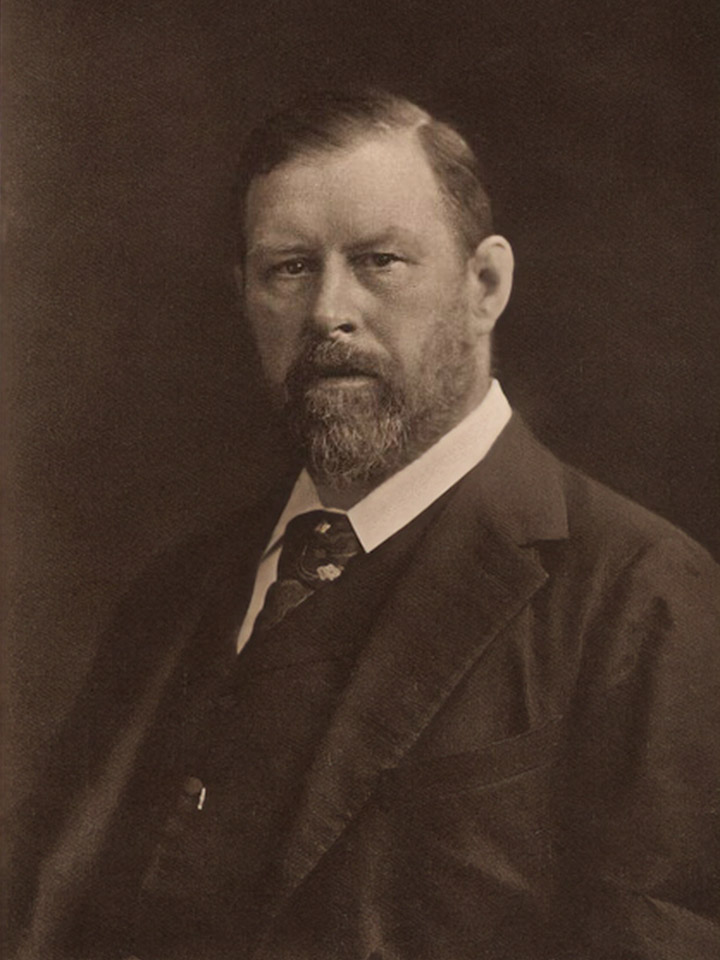Bram Stoker
Birth Name: Abraham Stoker
Born: November 8, 1847 in Dublin, Ireland
Died: April 20, 1912 in London, England
Time Period: Victorian
Expertise: Business Manager, Critic, Letter Writer, Novelist, Short Story Writer
Known For: Dracula

Quotes
Interesting quotes by Bram Stoker
“We learn from failure, not from success!”
“How blessed are some people, whose lives have no fears, no dreads; to whom sleep is a blessing that comes nightly, and brings nothing but sweet dreams.”
“Despair has its own calms.”
ADVERTISEMENT
Bio
A brief biography of Bram Stoker
Abraham Stoker (better known as Bram Stoker) was born November 8, 1847 in Clontarf, Dublin, Ireland. He is best known for his Gothic horror novel, Dracula. During his lifetime he was not widely known for his writing but as the assistant for actor Sir Henry Irving and business manager of the Lyceum Theatre.
Abraham was the third of seven children and due to an unknown illness remained bedridden until the age of seven. It was at this time that he began his schooling and was educated at a private school run by William Woods. After his miraculous recovery, he suffered no more illnesses and even became an athlete when he attended Trinity College from 1864 to 1870. He received a Bachelor of Arts degree and pursued his masters in 1875. He was named University Athlete and played multiple sports, including rugby for Dublin University. He was also the president of the University Philosophical Society where he published his first paper, Sensationalism in Fiction and Society, and was an auditor for the College Historical Society, the Hist.
While he was a student, Stoker became interested in the theater, and eventually became the theater critic for Dublin Evening Mail. Theater critics were not highly regarded, but he gained notoriety due to the quality of his work. He wrote a review of Henry Irving’s Hamlet and was consequently invited to dinner by the actor, where they became friends. During this time he also wrote a series of stories, including "Crystal Cup" in 1872 and "The Chain of Destiny," which were both published. In 1876, while he was a civil servant in Dublin, he wrote a non-fiction book, The Duties of Clerks of Petty Sessions in Ireland, which was published in 1879. He was also very interested in art, and was a founder of the Dublin Sketching Club.
In 1878 Bram Stoker married Florence Balcombe, a "celebrated beauty" who was the former love interest of Oscar Wilde. The married couple moved to London where Stoker took up the job as business manager for the Lyceum Theater, a job he would have for the next 27 years—a job which brought him notoriety due to Henry Irving being the most famous actor at the time. Bram also began to mingle with the likes of James Whistler, Sir Arthur Conan Doyle and Hall Caine. It was around this time, in December of 1879, that Florence gave birth to their only child, Noel Thornley Stoker.
Bram Stoker traveled the world with Henry Irving and enjoyed his trips to the United States where he was twice invited to the White House and made acquaintances with William McKinley and Theodore Roosevelt. Stoker staged two of his novels in the States and used Americans as his characters, the most famous being Quincey Morris in Dracula. Between 1893 and 1910, Stoker took regular visits to Cruden Bay in Scotland where he did a large amount of his writing. He set two of his novels in this locale—The Watter’s Mou’ and The Mystery of the Sea. While there in 1895, Stoker began his work on Dracula, while residing at the Kilmarnock Arms Hotel. The nearby Slains Castle is believed to be inspiration for Bram’s descriptions of Castle Dracula, including its distinct, octagonal hall.
In addition to Dracula, Stoker wrote other horror fiction such as The Lady of the Shroud and The Lair of the White Worm, as well as a romantic thriller, The Snake’s Pass, which revolved around the legend of Saint Patrick.
Bram Stoker and his wife enjoyed a long, happy marriage until a number of strokes ended his life. Florence cared for him tirelessly until the end. Some attribute his death to overwork, while others believe tertiary syphilis was the cause. His death certificate stated the cause as, “Locomotor ataxia.” Stoker died on April 20, 1912 as No. 26 St George’s Square, London. He was cremated and his ashes were set to rest in Golders Green Crematorium. His son Noel’s ashes were added to Stoker’s urn when he died in 1961. His wife’s ashes were instead scattered at the Gardens of Rest when she died in 1937.
ADVERTISEMENT
Works by Bram Stoker

Download free Bram Stoker books. Listen to Bram Stoker audiobooks.

ADVERTISEMENT
External Links for Bram Stoker
Bram Stoker on Wikipedia
https://en.wikipedia.org/wiki/Bram_StokerBram Stoker on Wikisource
https://en.wikisource.org/wiki/Author:Abraham_StokerADVERTISEMENT
Other Authors

See other authors of the Victorian period
- Emilio Aguinaldo
- Anonymous
- Ethel Lynn Beers
- Madison Cawein
- Mortimer Collins
- James David Corrothers
- Eugene Debs
- Frederick Douglass
- Paul Laurence Dunbar
- Thomas Hardy
- Henry Wilmarth Hazzen
- William Hope Hodgson
- Henry Wadsworth Longfellow
- Edgar Allan Poe
- Robert Louis Stevenson
- Alfred, Lord Tennyson
- Mark Twain
- August Vogel
- Walt Whitman
- John Greenleaf Whittier
- Oscar Wilde
- Kaiser Wilhelm II

